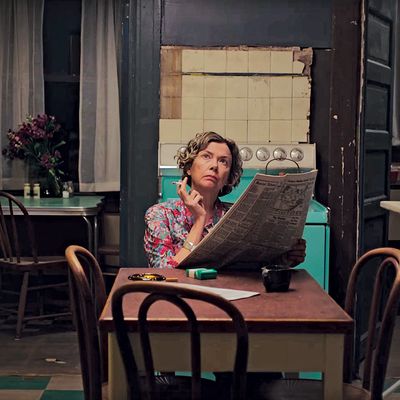
As a 55-year-old single mother in Mike Mills’s 20th Century Women, Annette Bening is too singular to be summed up in a few tired adjectives. She’s irreducible. It’s 1979 in Santa Barbara. The counterculture is breathing its last, punk is briefly ascendant, and Jimmy Carter is about to usher in the Reagan era by accusing the American people of having lost their spiritual center. (We know how much Americans love being shamed.) Bening’s character, Dorothea, wears her hair short and mussed and her shirts loose. She follows the stock market too avidly to fit in with aging hippies, but she’s too willfully tousled to suit the squares. She’s often at furious cross-purposes with herself. Her mouth sagging, she gazes helplessly on her teenage son, Jamie (Lucas Jade Zumann), and then enlists two younger women to reach out to the boy to monitor his development: Abbie (Greta Gerwig), a flaky, ruby-haired photographer who rents a room in their rambling house, and Julie (Elle Fanning), a twiggy blonde beauty who (unbeknownst to Dorothea) scampers up the scaffolding every night and slips into Jamie’s bed. They don’t have sex: Julie just wants Jamie’s warmth — which drives the lovelorn, hormonal teenager to despair. He wants to be a modern, sensitive, feminist male, but these 20th-century women are confounding.
20th Century Women is irreducible, too, although certain adjectives and adverbs do leap to mind: generous, reflective, absolutely delightful. Mills reportedly based the script on his teenage years, but without the emotionally absent father depicted in his last film, Beginners. (The old man came out of the closet after the death of Mills’s mother and had a joyful last act.) Mills’s alter ego, Jamie, is the hub of the story, but the focus is firmly on the women who revolve around him. Thirty-seven years later, Mills is still trying to see beyond his adolescent navel and figure out what was going on in their hearts and heads. Parts of his mother elude him still.
It’s a good thing that when Bening connects with a role, a screenwriter doesn’t need to give you signposts. She’s infinitely reactive. Dorothea’s wheels turn furiously as she sits and smokes another in a long line of cigarettes in an effort to find her equilibrium. She’s always chafing against her limitations, trying to be a good mother but too prickly and winded by disappointment to connect with her son fully. She gathers people around her dinner table — boarders, colleagues, even a fire chief who puts out her car when it spontaneously combusts. It’s as if she wants to be Auntie Mame but is finally too judgmental, too prudish, to carry the impulse through. I can’t think of another actress who could make Dorothea so full. This is the kind of acting that makes you feel more alive.
Bening must have had that effect on her co-stars, too. Gerwig’s overeagerness — she can’t seem to think onscreen without acting with her eyes, eyebrows, mouth, forehead, each feature on its own busy track — is tempered, and the simpler Gerwig is, the more we see her depths. She’s wonderful. A bout with cervical cancer has left Abbie with little hope of having children, but she refuses to succumb to hopelessness. She asks Dorothea’s other boarder — Billy Crudup as an aging hippie car mechanic and potter — if he wants to have sex and then, in a magically funny scene, casts him as a photographer who can’t keep himself from touching her. Pleasure doesn’t just come to Abbie: She searches it out and builds a stage for it. As the recklessly promiscuous Julie, the exquisite Fanning continues (after the loony-tunes Neon Demon) to explore the psychological effects of being gazed on every moment with lust or envy — chafing under her mask of beauty, searching for a sphere of privacy or comfort or chaste love and, along the way, turning poor, horny Jamie into a seething wreck. As said wreck, Zumann has a face that’s almost as watchable as Fanning’s, along with a restless intelligence that captures the movie’s distinctive mixture of squirminess and longing.
20th Century Women, like Beginners, unfolds in the past tense, a memoir in which we’re frequently reminded that what we’re looking at is long gone. Jamie does most of the narration, but the other characters weigh in to say what happened to them and the country — how they lived and, in one case, died. The music by Roger Neill is mystical, its center always shifting. But if there’s a Terrence Malick vibe to some of the visuals, the people don’t resolve into archetypes. They’re always busting loose and tugging the story off course. I felt a sharp sense of loss when the movie ended — I didn’t want to see this family dissolve and the actors move on to other roles. Mike Mills is a lucky guy getting to spend so much time with a trio of women like this: both the real ones and the marvelous actresses who have made his memories live.
*This article appears in the December 12, 2016, issue of New York Magazine.





